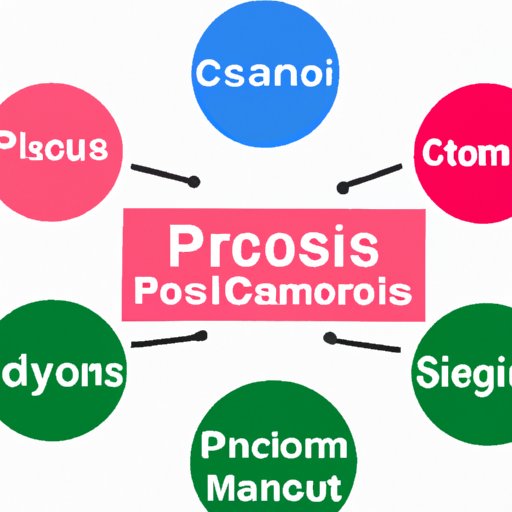
Introduction
Polycystic Ovary Syndrome (PCOS) is a common hormonal disorder affecting women of reproductive age. It affects millions of women worldwide and has serious implications on their health and overall quality of life. This article provides an in-depth understanding of PCOS as a disease, its symptoms, causes, and methods of diagnosis. Additionally, we examine how people living with PCOS manage it and highlight research and nutritional practices to prevent and alleviate its symptoms. Finally, we discuss how PCOS affects women and marginalized groups from a feminist perspective.
A Medical Perspective
PCOS is a hormonal disorder that affects the ovaries. For a woman with PCOS, the ovaries may not release eggs regularly and instead may form small cysts (fluid-filled sacs). The symptoms of PCOS include irregular periods, weight gain, increased facial hair, acne, and infertility. Although PCOS is a complex disorder, researchers believe it is caused by a combination of factors, including genetics, insulin resistance, and hormonal imbalances. Diagnosis usually involves a physical exam, blood tests, and ultrasound imaging.
The health implications of PCOS are numerous and require attention to prevent further complications. PCOS increases the risk of developing type 2 diabetes, cardiovascular disease, and endometrial cancer. Additionally, women with PCOS who become pregnant have a higher risk of developing gestational diabetes, high blood pressure during pregnancy, and delivering preterm. Further, PCOS has significant implications on mental health and can lead to depression, anxiety, and low self-esteem.
A Personal Story
Living with PCOS can be challenging and stressful. Many women struggle with infertility, menstrual irregularities, and other symptoms that can affect their quality of life. One such woman, Nia, a 30-year-old lawyer, shares her personal story of living with PCOS. According to Nia, she was first diagnosed with PCOS at age 22 after experiencing irregular periods and acne. Since then, she has struggled with infertility, weight gain, and anxiety. Nia has learned to manage her condition by staying active and eating a balanced diet. She also participates in regular therapy sessions to manage her anxiety and stress levels.
Other common problems faced by people with PCOS include weight gain, sleep disturbances, and low energy levels. According to the PCOS Foundation, people with PCOS also have an increased risk of developing eating disorders like bulimia and binge-eating disorder.
A Research Focus
Researchers are continually exploring PCOS as a disease, its causes, and possible treatments. A new understanding of PCOS as a metabolic disorder has paved the way to diagnose and manage it. Weight management is a key part of managing PCOS, and there is ongoing research into nutrition and dietary interventions that can help. Additionally, there are treatments that can improve fertility, regulate menstrual cycles, and reduce symptoms like androgen excess, hirsutism (excessive body hair), and acne. Metformin, an insulin regulator, has shown promise in reducing symptoms and helping manage weight for people with PCOS. Researchers are also testing new medications that directly target the hormonal imbalances characteristic of PCOS.
A Nutritional Approach
Nutrition and lifestyle choices play a significant role in managing PCOS. A balanced diet rich in whole grains, fruits, and vegetables, lean protein, and healthy fats can help manage weight and reduce the risk of type 2 diabetes and cardiovascular disease. Additionally, studies have shown that a low-glycemic index diet can regulate menstrual cycles, reduce insulin resistance, and decrease androgen levels. Regular exercise and physical activity can also help manage PCOS symptoms and reduce stress levels.
In summary, people living with PCOS should aim to eat a balanced diet, track their food intake and physical activity, and work with their healthcare team to develop a manageable weight-loss plan. Nutritional supplements like probiotics and vitamin D may also be beneficial in managing PCOS symptoms.
A Feminist Perspective
PCOS is a disease that primarily affects women and has serious health implications, but it is often overlooked and misdiagnosed. Women and marginalized groups can experience significant health disparities, limited healthcare access, and stigmatization and shame associated with the diagnosis. Women of color are less likely to receive a PCOS diagnosis and often have additional challenges managing it due to systemic health inequities like healthcare access and affordability. Feminist advocates push for better access to diagnostic testing, therapeutic and preventive measures, and accurate epidemiological studies. PCOS should be viewed from this lens in its treatment, research, and public health approaches.
Conclusion
Polycystic Ovary Syndrome is a widespread, complex, and often misunderstood disorder affecting countless women worldwide. This article aimed to provide an in-depth understanding of PCOS as a disease, its implications, and its management through various lenses. While there is no cure for PCOS, adopting a healthy lifestyle with a proper diet and exercise plan, supplementing with necessary nutrients, and seeking medical treatment can help manage symptoms and lead to a better quality of life.
If you think you have PCOS or are experiencing any of the symptoms associated with it, seek medical attention to receive the appropriate diagnosis and treatment. Connect with support groups and organizations like the PCOS Foundation to learn about new research, share experiences, and build a community of like-minded individuals. Together, we can raise awareness and promote a better understanding of PCOS.




